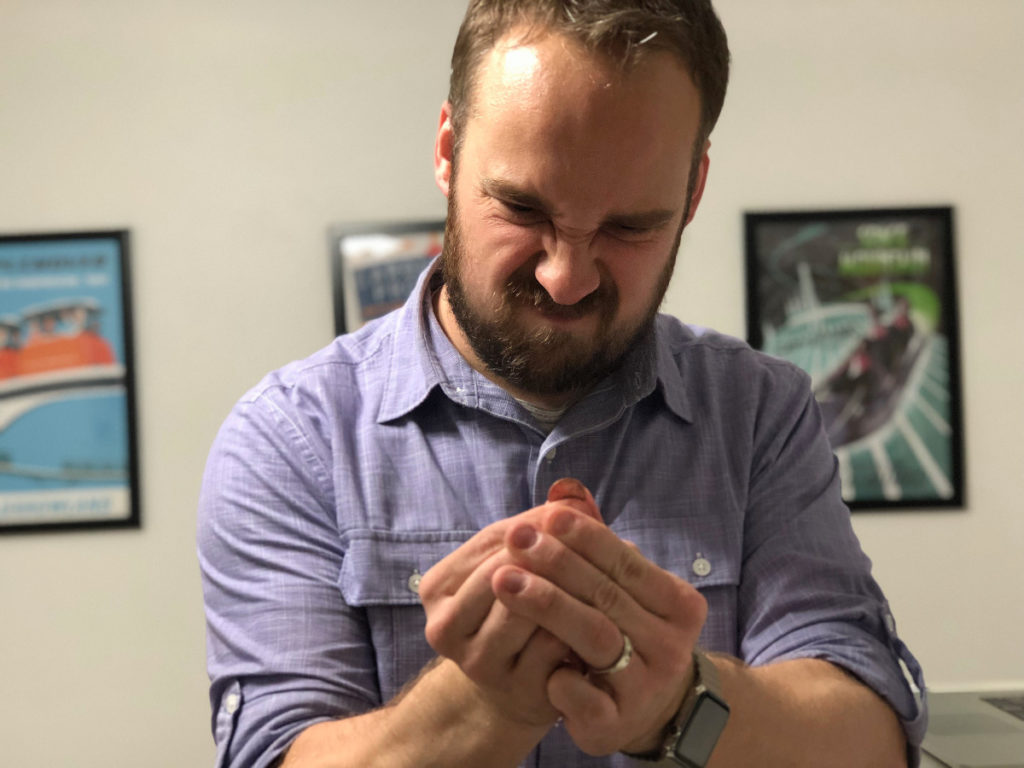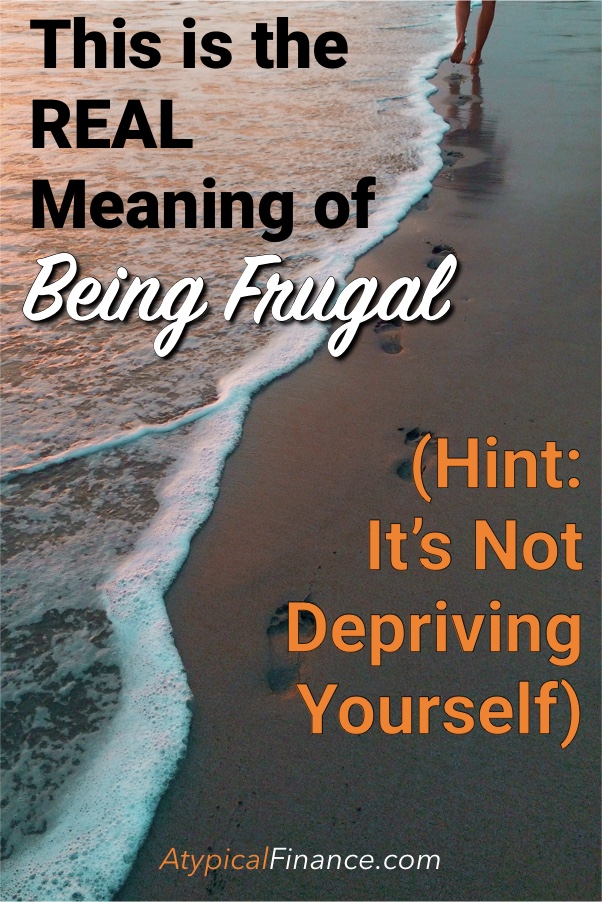When you are trying to get your financial life in order, it is very easy to start pinching pennies.
It’s easy to become cheap.
It’s way too easy to overcompensate and not spend any money in order to try and control your money.
But as I’ve written before, balance is key.
If you go from spending money to all of a sudden not spending any money, you’re going to burn out.
This is where frugality comes into play.
Being frugal isn’t the same as being cheap but it is very easy to confuse the two.
In the personal finance community, whether you’re on team frugal or team no-frugal, there seems to be a consensus that deprivation just goes with the territory when you’re trying to be frugal.
That’s exactly the way I used to think.
If you think the same way, let me stop you right there.
There should be no deprivation when it comes to being frugal.
Being frugal doesn’t mean you can’t spend money.
It doesn’t mean you can’t spend a lot of money (if you can afford it).
Being frugal is the art (yes, I call it art) of spending money on things that YOU value.
It’s the art of no longer spending money on things that don’t mean anything to you so you can have more money to spend on things that do.
It’s the art of doing what you want with your money.
Don’t get me wrong, price can still matter. But when you are frugal, the cost isn’t the only part of the equation.
And it never should be.
For reference, this is what the traditional view of frugality looks like: pinching pennies. Looks silly, doesn’t it?
And your fingers hurt.

Be the REAL Meaning of Frugal
Frugal is defined in Webster’s dictionary as “characterized by or reflecting economy in the use of resources.”
It’s being economical with your money.
To take it a step further, economical is defined as “marked by careful, efficient, and prudent use of resources.”
That does not mean that you don’t spend money.
That means you are intentional with your money.
Sure, there are times when you may have to cut something out or change the way you spend to get something you want, but that’s not deprivation.
That’s intentionally focusing on using your money to reach a goal, whether it’s tickets to your favorite Broadway revival, a brand new phone you have to have, or saving for a vacation.
Related: How to Manage Your Money Intentionally
Let me tell you a story.
When I was desperately trying to get out of the restaurant industry, I became very cheap. I wanted to do anything to get out.
I’d get upset with my wife because she ran out of a $5 piece of makeup and wanted to buy more.
Other times, something small would break that we would have to replace for like $20 and I would get all cranky about it.
I was cheap (among other words I shouldn’t use here).
To make matters worse, I would turn around and spend money on things I didn’t need (like a video game or some random unhealthy snack at the gas station).
There was no balance and I was trying to make myself feel better.
Being the real definition of frugal is much more sustainable as a financial lifestyle because it helps provide that balance you (and I) so desperately need.
When you have balance, it becomes a lot easier to stop yourself from spending out of emotion or out of impulse.
The best part is that in order to be the real definition of frugal, there is one thing that you need to do.

You have to determine what you value.
Determining what you value is the very essence of being frugal.
You have to know yourself and what you do and do not like.
It is the conscious decision to not spend money on certain things (what you don’t value) so you can spend money on other things (what you do value).
Again, that’s not deprivation because you are free to spend money on what you value and actually want.
So how exactly do you determine what you value and get this newfound freedom called frugality?
Here are two things to consider to help you figure out if you value something enough to spend money on.
First, Do you TRULY value it?
If you’re going to spend money on things you value, you need to know if it’s something you truly value or not.
A perfect example in my own life I can give you is video games because their value has changed so drastically for me.
At one point in my life, video games were very important. I literally used to stay up late and play one almost every night for hours.
Then, another point in time came when video games weren’t important anymore, but I was still buying them like they were. Big waste of money.
Now, I’ve come to the point where I only buy a video game if I’m thoroughly convinced it will be worth my time.
How do I determine that? I asked myself three questions that I recommend you ask yourself as well.
They are:
1. How much time am I going to be spending on this?
With video games, I noticed a significant drop in the amount of time available—and the amount of time I was willing to commit—to playing them.
When I was a restaurant manager especially, I simply did not have the time to play video games.
Even now, I have plenty of other things that I want to do instead so I cannot realistically get lost for hours in a video game like I used to.
I’ve even tried that fairly recently. Do you know what happened?
I feel like I missed out on doing something more valuable. It wasn’t worth it to me.
Why spend money on something you aren’t going to have time to do?
Ask yourself how much time you’ll realistically be spending on whatever it is you want to buy.
2. How much fun do I have doing this?
Over the course of a few years, I started to really pay attention to how much fun I was having when playing video games.
It was starting to be less and less.
A lot of games I picked up were very similar to the old ones I used to play, but they were not as well done or didn’t have as good of a story to keep me engaged.
It got to the point where instead of playing the new games, I just played an old one I had that was similar.
Now, I don’t even buy new games unless I know it’s something I’m going to enjoy. I just keep playing the old games.
It’s easier and cheaper.
If I don’t have time to play, I don’t have to worry about money being wasted.
You have to really pay attention to what you feel when trying to determine your fun level.
And it may take some time to figure out.
One thing that I’ve noticed is if I’m doing something and I start to desire something similar I used to do, then I’m not having a lot of fun.
It’s not worth spending money on something that I know I’m not going to enjoy.
3. Is this something I enjoy sharing with others?
There are experiences and things I used to do that were fun to do with other people. It gave us shared interests.
Let’s look at video games in my own life again.
Back quite a few years ago, when I was really into video games, my friends and I used to have video game nights fairly often.
We would gather around a couple of TVs, eat a lot of pizza, and play Halo for a few hours. We used to do this at least once a month, and it was a blast!
Now, instead of getting together to play video games, we find it more valuable to go out to eat and sit around a table to talk.
Sure, we reminisce about the old days (when we were ALL younger), but we’d rather talk about them instead of trying to recreate something we don’t find as valuable in our lives anymore.
This was the last thing I asked myself to determine that I really don’t need to buy many video games anymore.
There are also going to be things that are super valuable to you but only if you share them with others.
For example, I really enjoy dark beer. They are just delicious to me.
However, I hardly ever have a beer alone.
I find it way more valuable to share a Dragon’s Milk with a friend or go out to a local brewery and try their beer together rather than just sit at home and have a beer.
Because of this, I have no issue with spending money on it.
If what you are purchasing helps create bonds with your family and friends, it’s probably going to be a good purchase.
If not, it’s safe for you to leave it on the shelf without missing out on anything.

Does it Continue to Create Value?
The second thing to consider is if the things you are spending money on are continuing to create value for you.
I’ve suggested before to spend money on experiences rather than things. This is because experiences tend to continue to create value.
How? By creating memories and strengthening either yourself or your relationships.
Memories are something that you can relive in your mind.
Relationships are strengthened when you spend time with someone. And hobbies like reading or other things you may enjoy improve your mind and relax you.
Like in question 3 above, getting together with my friends for dinner is something I am more than willing to spend money on because it continues to create value.
It cultivates and strengthens the relationships with each one of them.
It creates memories we can enjoy.
I have a very good friend of mine with whom I enjoy Saturday morning breakfast about once a month.
It’s a great time and well worth it.
Another thing I like to spend money on is Disney World vacations.
I love the experience there. I love the food and the atmosphere.
Everything about it is enjoyable to me. I not only have a great experience but it forms great memories that I can relive in my mind.
It creates stronger relationships through being able to spend time with my family there and make memories with them.
It is something I value and it also creates continual value in my life.
Disney has excelled at giving you atmosphere and experience even while you’re waiting in line.
Their newest rides (and some of the older, updated rides) now have games and activities you can do while waiting in line, furthering memory creation.
Ask yourself if what you are spending on will continue to create value in your life.
Memory-making or a sense of accomplishment are just a couple of examples of creating continual value.
So what’s next?
What’s next is the fun part.
Put your money toward something you love to do or be a part of!
I encourage you to use the same tips above to determine what you really value, and then go all in.
Don’t feel guilty about spending money on what matters to you.
When you set aside money for the things that you truly value, there is no longer any reason to feel guilty about it.
Don’t be afraid to set aside and budget money for anything you value.
In fact, it’ll be easier to maintain your budget if you’re spending on your values.
Despite getting a bad rap as being part of penny-pinching, being frugal is a necessary step in being financially free.
I am frugal (just ask my wife) and I don’t feel restricted or deprived.
Being frugal is sometimes choosing value over price, or it’s sometimes not spending money at all.
When you figure out what you value, and subsequently stop spending money on the things you don’t, you have that extra money to spend on your values.
It’s not cheap or penny-pinching. It’s not deprivation.
Being frugal is freedom.


















